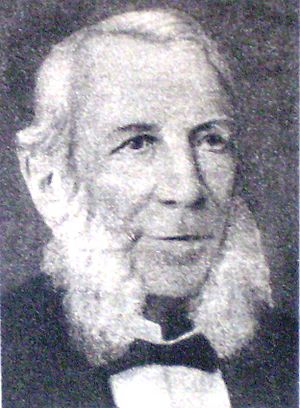Juan María Gutiérrez facts for kids
Juan María Gutiérrez (born May 6, 1809 – died February 26, 1878) was an important Argentine leader. He was many things: a statesman (someone involved in government), a jurist (a legal expert), a surveyor (who measures land), a historian, a critic, and a poet.
He was a big supporter of liberal ideas in Argentina. He also helped a lot to promote Argentine culture in the 1800s. He wrote many different kinds of works. These included novels, plays about everyday life (called Costumbrist dramas), biographies, and scientific books.
His political journey started after Juan Manuel de Rosas, a powerful leader, lost his power in 1852. The next year, Gutiérrez represented the Entre Ríos area at a big meeting to create Argentina's constitution. From 1854 to 1856, he was the foreign minister for the Argentine Confederation. This meant he handled Argentina's relationships with other countries. He also helped start the Asociación de Mayo, an important group of thinkers, with Esteban Echeverría.
Gutiérrez was also very important for science and technology in Argentina. He was the head, or rector, of the University of Buenos Aires from 1861 until he retired in 1874. During his time there, many famous European professors joined the university. He also helped start the study of natural sciences in Argentina with Hermann Burmeister.
Juan María Gutiérrez once said: "Luckily, I have a flexible personality and find as much promise in a poetry book as in a math book." Another famous person, Juan Bautista Alberdi, said about him: "Because of his noble heart and bright mind, Gutiérrez was a poet without stopping being a mathematician. This shows the wonderful mix of good taste and good sense that filled his intelligence."
Contents
Life Story of Juan María Gutiérrez
Gutiérrez loved books and learning from a young age. He also enjoyed science, especially mathematics. He studied both engineering and law. When he was 27, he earned his law degree. His special paper was called Sobre los tres poderes públicos ("On the three public powers"). His family didn't have much money, so he didn't have to pay for his studies. But he chose to pay his own way. He worked as a surveyor and engineer for the Topographical Department. He also translated books and wrote for literary magazines.
He helped create and lead the Association of Historical Studies. He also often went to meetings of the Literary Salon, which was started by Marcos Sastre. In 1837, he gave a speech called Physiognomy of Spanish learning.
Challenges During Rosas's Rule
During the time Juan Manuel de Rosas was in charge, Gutiérrez supported Argentines who had to leave the country and go to Montevideo. Because of this, he lost his job and was put in prison. In 1840, he moved to Uruguay himself. This happened after people found out he secretly wrote for El Iniciador, a newspaper that criticized Rosas. Even while in Uruguay, he kept working as an engineer and land surveyor.
He, along with Juan Bautista Alberdi and Esteban Echeverría, founded the Asociación de Mayo. This was a group of thinkers who wanted to improve Argentina. In 1843, he and Alberdi traveled through the Americas and Europe. While in Valparaíso, Chile, Gutiérrez taught and wrote a lot. One of his well-known works from this time was América Poética. He became the first director of the Naval Academy in Valparaíso. He also published biographies translated from French and shared his findings about the New World.
Return to Argentina and Public Service
When Rosas lost power in 1852, Gutiérrez was able to return to Argentina. He attended the Constitutional Convention in 1853. There, he supported the San Nicolás Agreement, which aimed to unite the country. He became the foreign minister for the Argentine Confederation under Justo José de Urquiza. In this role, he helped make the San José de Flores Agreement a success in 1859. This agreement brought Buenos Aires and the other provinces of the Argentine Confederation back together.
Gutiérrez also started a career as a journalist in Buenos Aires. He served as a national deputy, which is like a representative in government. President Bartolomé Mitre chose him to be the head of the University of Buenos Aires. He held this important position from 1861 to 1874. During his time as rector, he started the university's School of Engineering in 1866. Later, he attended another Constitutional Convention in Buenos Aires between 1870 and 1873.
See also
 In Spanish: Juan María Gutiérrez para niños
In Spanish: Juan María Gutiérrez para niños
 | William M. Jackson |
 | Juan E. Gilbert |
 | Neil deGrasse Tyson |


